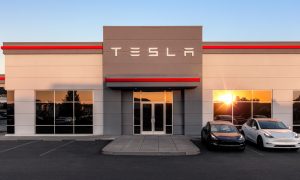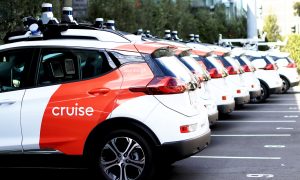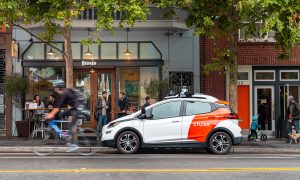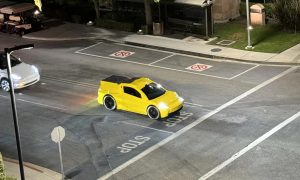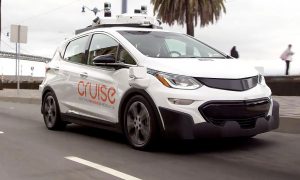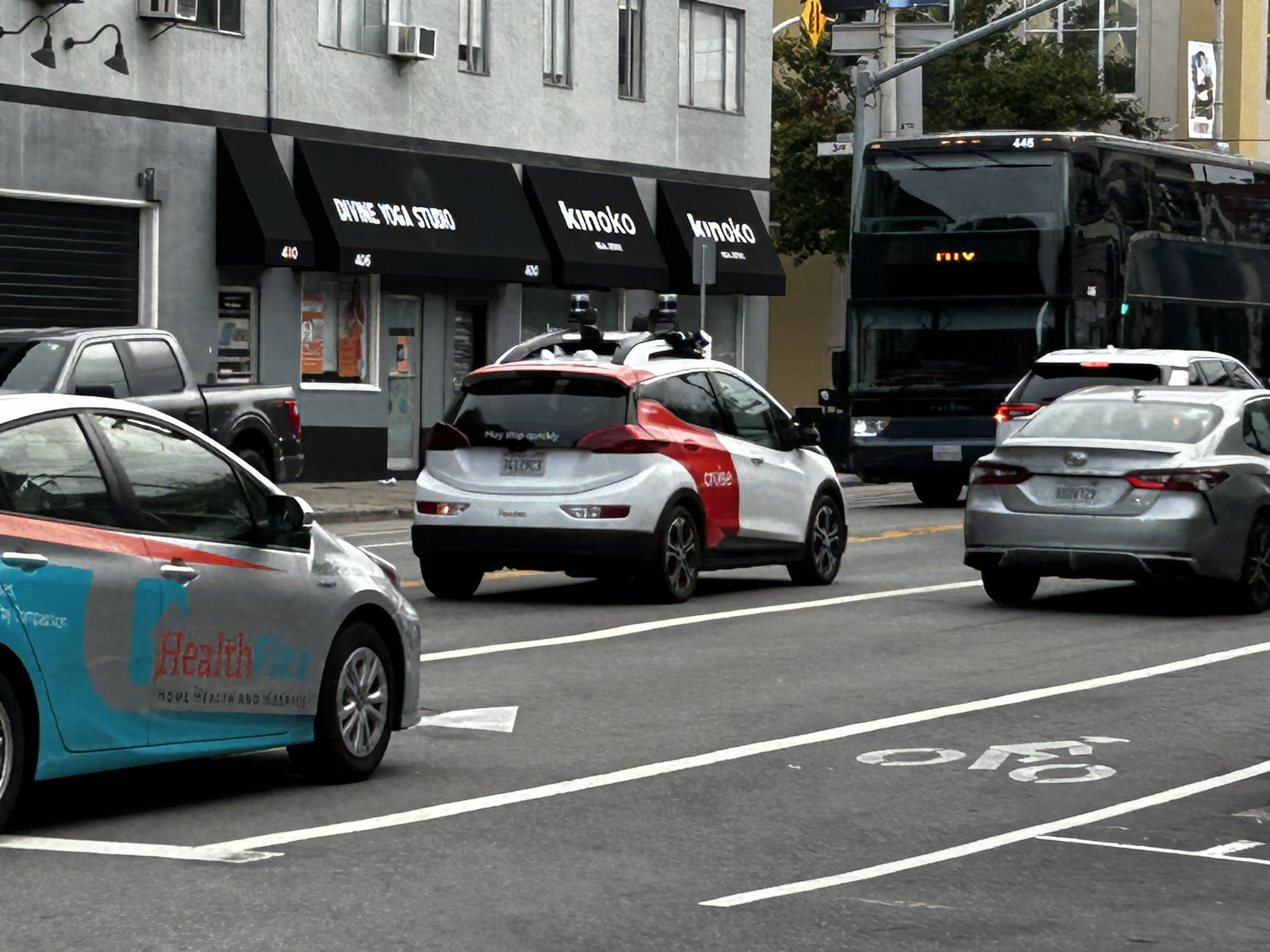

News
Cruise to reduce self-driving fleet by 50% in SF following robotaxi crash
The California Department of Motor Vehicles (DMV) has asked General Motors’ self-driving unit, Cruise, to temporarily reduce its robotaxi fleet by 50% in San Francisco. The request came after one of the company’s driverless vehicles was involved in a crash with a fire truck last week.
The California DMV noted that its is investigating “recent concerning incidents” involving autonomous robotaxis in the city. With this in mind, the DMV has advised that Cruise must reduce its San Francisco fleet by half until the investigation is completed and the self-driving company takes appropriate actions to improve road safety.
Following is the CA DMV’s statement about Cruise’s recent robotaxi incidents.
“Safety of the traveling public is the California DMV’s top priority. The primary focus of the DMV’s regulations is the safe operation of autonomous vehicles and safety of the public who share the road with these vehicles.
“The DMV is investigating recent concerning incidents involving Cruise vehicles in San Francisco. The DMV is in contact with Cruise and law enforcement officials to determine the facts and requested Cruise to immediately reduce its active fleet of operating vehicles by 50% until the investigation is complete and Cruise takes appropriate corrective actions to improve road safety. Cruise has agreed to a 50% reduction and will have no more than 50 driverless vehicles in operation during the day and 150 driverless vehicles in operation at night.
“The DMV reserves the right, following investigation of the facts, to suspend or revoke testing and/or deployment permits if there is determined to be an unreasonable risk to public safety.”
With Cruise agreeing to reduce its fleet by 50%, the company also released a blog post explaining the circumstances that led up to the accident. As per Cruise, the robotaxi identified the emergency vehicle almost immediately as it came into video. The robotaxi operator also noted that the vehicle initiated a braking maneuver and reduced its speed, but it was ultimately unable to avoid the collision.
All in all, the damage is super light. Good learning experience. A deaf, colorblind, human driver would have probably also gotten clipped.
In this situation, if you don't hear the truck and you don't notice the approaching scattered red light, reflecting on the buildings/street… pic.twitter.com/mTAGEQkAEk
— oFFMetaSweat (@oFFMetaSweat) August 18, 2023
Following is Cruise’s post about the incident.
“While our investigation is ongoing and we remain in contact with city officials and regulators, we wanted to provide an update on our preliminary analysis on the incident involving an emergency vehicle colliding with a Cruise AV.
“First and foremost, our primary concern remains with our passenger and their well-being. We have been in contact to offer support and will remain in touch.
“In terms of what occurred around the scene of the collision there are many aspects that looked typical from the AV’s perspective and several factors that added complexity to this specific incident.
“The AV positively identified the emergency vehicle almost immediately as it came into view, which is consistent with our underlying safety design and expectation. It is worth noting, however, that the confines of this specific intersection make visual identification more challenging – for humans and AVs alike – as it is significantly occluded by buildings, meaning that it is not possible to see objects around the corner until they are physically very close to the intersection.
“The AV’s ability to successfully chart the emergency vehicle’s path was complicated by the fact that the emergency vehicle was in the oncoming lane of traffic, which it had moved into to bypass the red light.
“Cruise AVs have the ability to detect emergency sirens, which increase their ability to operate safely around emergency vehicles and accompanying scenes. In this instance, the AV identified the siren as soon as it was distinguishable from the background noise.
“The Cruise AV did identify the risk of a collision and initiated a braking maneuver, reducing its speed, but was ultimately unable to avoid the collision.
“During the course of more than 3 million miles of fully autonomous driving in San Francisco we’ve seen an enormous number of emergency vehicles – more than 168,000 interactions just in the first 7 months of this year alone. Our first responders are trying to balance keeping all of us safe while quickly responding to emergency scenes and we’re grateful for their work and dedication.
“We realize that we’ll always encounter challenging situations, which is why continuous improvement is central to our work. We will continue to work in partnership with regulators and city departments on EMV interactions to reduce the likelihood of incidents like these happening again.”
Don’t hesitate to contact us with news tips. Just send a message to simon@teslarati.com to give us a heads-up.
Elon Musk
Why Tesla’s Q3 could be one of its biggest quarters in history
Tesla could stand to benefit from the removal of the $7,500 EV tax credit at the end of Q3.

Tesla has gotten off to a slow start in 2025, as the first half of the year has not been one to remember from a delivery perspective.
However, Q3 could end up being one of the best the company has had in history, with the United States potentially being a major contributor to what might reverse a slow start to the year.
Earlier today, the United States’ House of Representatives officially passed President Trump’s “Big Beautiful Bill,” after it made its way through the Senate earlier this week. The bill will head to President Trump, as he looks to sign it before his July 4 deadline.
The Bill will effectively bring closure to the $7,500 EV tax credit, which will end on September 30, 2025. This means, over the next three months in the United States, those who are looking to buy an EV will have their last chance to take advantage of the credit. EVs will then be, for most people, $7,500 more expensive, in essence.
The tax credit is available to any single filer who makes under $150,000 per year, $225,000 a year to a head of household, and $300,000 to couples filing jointly.
Ending the tax credit was expected with the Trump administration, as his policies have leaned significantly toward reliance on fossil fuels, ending what he calls an “EV mandate.” He has used this phrase several times in disagreements with Tesla CEO Elon Musk.
Nevertheless, those who have been on the fence about buying a Tesla, or any EV, for that matter, will have some decisions to make in the next three months. While all companies will stand to benefit from this time crunch, Tesla could be the true winner because of its sheer volume.
If things are done correctly, meaning if Tesla can also offer incentives like 0% APR, special pricing on leasing or financing, or other advantages (like free Red, White, and Blue for a short period of time in celebration of Independence Day), it could see some real volume in sales this quarter.
You can now buy a Tesla in Red, White, and Blue for free until July 14 https://t.co/iAwhaRFOH0
— TESLARATI (@Teslarati) July 3, 2025
Tesla is just a shade under 721,000 deliveries for the year, so it’s on pace for roughly 1.4 million for 2025. This would be a decrease from the 1.8 million cars it delivered in each of the last two years. Traditionally, the second half of the year has produced Tesla’s strongest quarters. Its top three quarters in terms of deliveries are Q4 2024 with 495,570 vehicles, Q4 2023 with 484,507 vehicles, and Q3 2024 with 462,890 vehicles.
Elon Musk
Tesla Full Self-Driving testing continues European expansion: here’s where
Tesla has launched Full Self-Driving testing in a fifth European country ahead of its launch.

Tesla Full Self-Driving is being tested in several countries across Europe as the company prepares to launch its driver assistance suite on the continent.
The company is still working through the regulatory hurdles with the European Union. They are plentiful and difficult to navigate, but Tesla is still making progress as its testing of FSD continues to expand.
Today, it officially began testing in a new country, as more regions open their doors to Tesla. Many owners and potential customers in Europe are awaiting its launch.
On Thursday, Tesla officially confirmed that Full Self-Driving testing is underway in Spain, as the company shared an extensive video of a trip through the streets of Madrid:
Como pez en el agua …
FSD Supervised testing in Madrid, Spain
Pending regulatory approval pic.twitter.com/txTgoWseuA
— Tesla Europe & Middle East (@teslaeurope) July 3, 2025
The launch of Full Self-Driving testing in Spain marks the fifth country in which Tesla has started assessing the suite’s performance in the European market.
Across the past several months, Tesla has been expanding the scope of countries where Full Self-Driving is being tested. It has already made it to Italy, France, the Netherlands, and Germany previously.
Tesla has already filed applications to have Full Self-Driving (Supervised) launched across the European Union, but CEO Elon Musk has indicated that this particular step has been the delay in the official launch of the suite thus far.
In mid-June, Musk revealed the frustrations Tesla has felt during its efforts to launch its Full Self-Driving (Supervised) suite in Europe, stating that the holdup can be attributed to authorities in various countries, as well as the EU as a whole:
Tesla Full Self-Driving’s European launch frustrations revealed by Elon Musk
“Waiting for Dutch authorities and then the EU to approve. Very frustrating and hurts the safety of people in Europe, as driving with advanced Autopilot on results in four times fewer injuries! Please ask your governing authorities to accelerate making Tesla safer in Europe.”
Waiting for Dutch authorities and then the EU to approve.
Very frustrating and hurts the safety of people in Europe, as driving with advanced Autopilot on results in four times fewer injuries!
Please ask your governing authorities to accelerate making Tesla safer in Europe. https://t.co/QIYCXhhaQp
— Elon Musk (@elonmusk) June 11, 2025
Tesla said last year that it planned to launch Full Self-Driving in Europe in 2025.
Elon Musk
xAI’s Memphis data center receives air permit despite community criticism
xAI welcomed the development in a post on its official xAI Memphis account on X.

Elon Musk’s artificial intelligence startup xAI has secured an air permit from Memphis health officials for its data center project, despite critics’ opposition and pending legal action. The Shelby County Health Department approved the permit this week, allowing xAI to operate 15 mobile gas turbines at its facility.
Air permit granted
The air permit comes after months of protests from Memphis residents and environmental justice advocates, who alleged that xAI violated the Clean Air Act by operating gas turbines without prior approval, as per a report from WIRED.
The Southern Environmental Law Center (SELC) and the NAACP has claimed that xAI installed dozens of gas turbines at its new data campus without acquiring the mandatory Prevention of Significant Deterioration (PSD) permit required for large-scale emission sources.
Local officials previously stated the turbines were considered “temporary” and thus not subject to stricter permitting. xAI applied for an air permit in January 2025, and in June, Memphis Mayor Paul Young acknowledged that the company was operating 21 turbines. SELC, however, has claimed that aerial footage shows the number may be as high as 35.
Critics are not giving up
Civil rights groups have stated that they intend to move forward with legal action. “xAI’s decision to install and operate dozens of polluting gas turbines without any permits or public oversight is a clear violation of the Clean Air Act,” said Patrick Anderson, senior attorney at SELC.
“Over the last year, these turbines have pumped out pollution that threatens the health of Memphis families. This notice paves the way for a lawsuit that can hold xAI accountable for its unlawful refusal to get permits for its gas turbines,” he added.
Sharon Wilson, a certified optical gas imaging thermographer, also described the emissions cloud in Memphis as notable. “I expected to see the typical power plant type of pollution that I see. What I saw was way worse than what I expected,” she said.
-

 Elon Musk3 days ago
Elon Musk3 days agoTesla investors will be shocked by Jim Cramer’s latest assessment
-

 News1 week ago
News1 week agoTesla Robotaxi’s biggest challenge seems to be this one thing
-

 News2 weeks ago
News2 weeks agoTexas lawmakers urge Tesla to delay Austin robotaxi launch to September
-

 Elon Musk2 weeks ago
Elon Musk2 weeks agoFirst Look at Tesla’s Robotaxi App: features, design, and more
-

 Elon Musk2 weeks ago
Elon Musk2 weeks agoxAI’s Grok 3 partners with Oracle Cloud for corporate AI innovation
-

 News2 weeks ago
News2 weeks agoSpaceX and Elon Musk share insights on Starship Ship 36’s RUD
-

 News2 weeks ago
News2 weeks agoWatch Tesla’s first driverless public Robotaxi rides in Texas
-

 News2 weeks ago
News2 weeks agoTesla has started rolling out initial round of Robotaxi invites


